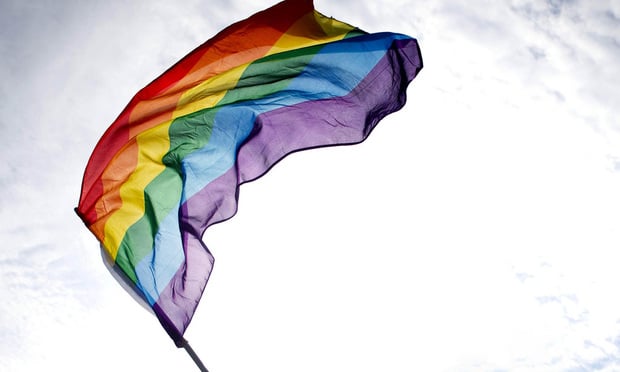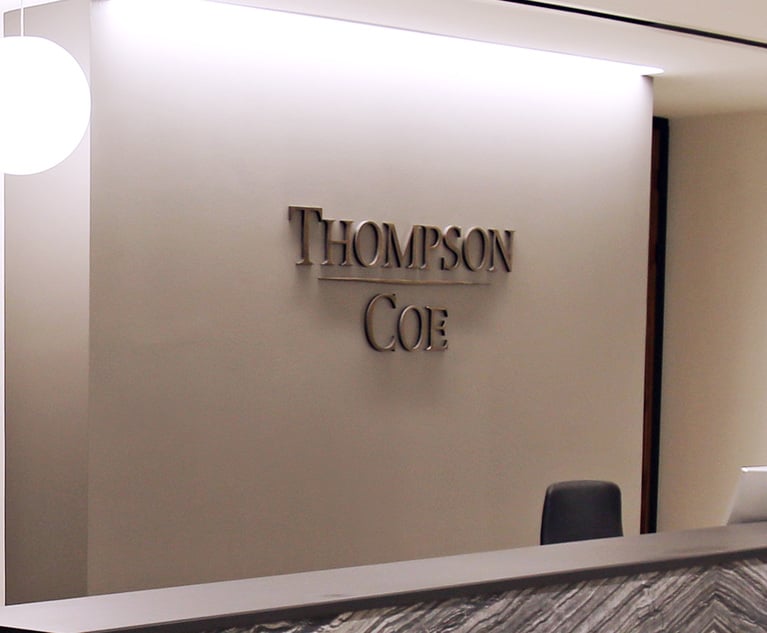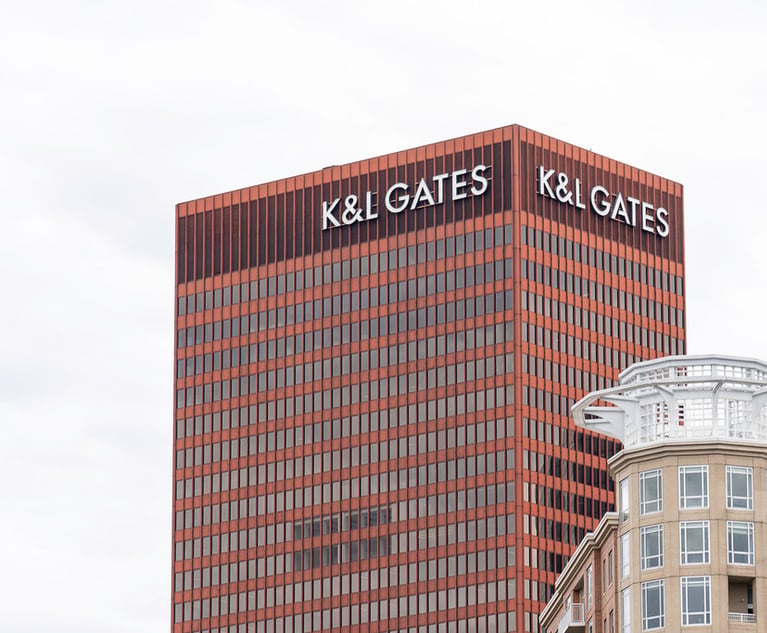Big Law Beats Big Business for LGBTQ Equality, Report Says
While law firms came out on top, the number of them receiving perfect scores from the Human Rights Campaign dropped this year after a change in criteria.
March 28, 2019 at 02:16 PM
3 minute read
 Photo: Diego M. Radzinschi/ALM
Photo: Diego M. Radzinschi/ALM
Once again, the country's biggest law firms outperformed corporate America in their level of support for lesbian, gay, bisexual, transgender and queer employees.
However, the number of firms receiving perfect scores in Human Rights Campaign Foundation's 2019 Corporate Equality Index, released Thursday, dropped from the 2018 peak. Of 164 firms participating, 114 received perfect scores. In the 2018 report, 127 of 160 participants earned the highest possible rating.
Still, this was enough to place the firms above every other industry tracked by the HRC.
“The highly competitive legal field continues to be the sector with the largest number of top-rated employers in the Corporate Equality Index,” Beck Bailey, acting director of the HRC Foundation's Workplace Equality Program, said in a statement. “Law firm leaders know that LGBTQ inclusion is absolutely essential in attracting and retaining top attorneys and staff.”
The number of firms receiving perfect scores had been steadily rising. The 2018 figure of 127 was a step up from 2017, which saw 112 perfect scores. That in turn was a rise from 95 in 2016 and 87 in 2015.
While 69.5 percent of the law firms participating received perfect scores for 2019, that figure outpaced the Fortune 500, where 55.7 percent of the companies participating earned scores of 100.
That number was also down in 2019, as 230 Fortune 500 companies received perfect scores in the previous year.
The survey, which is voluntary, evaluates the nation's largest companies and top-grossing law firms, the Am Law 100 and 200, in four areas: nondiscrimination policies based on sexual orientation, gender identity and expression; equitable benefits for LGBTQ workers and their families; supporting an inclusive culture and corporate social responsibility including public commitment to LGBTQ equality; and responsibility citizenship.
New criteria specifically introduced for 2019 look at whether companies and firms ensure full spousal and partner health care coverage parity, whether they affirm coverage for transition-related care and eliminate all so-called “transgender exclusions” from plans, and whether they ensure full LGBTQ inclusion in diverse supply chain programs.
In spite of the legal industry's apparent success in tackling inclusionary policies for the LGBTQ community, at least along the HRC's criteria, progress lags in other areas.
Among equity partnership ranks at the country's biggest firms in 2017, women made up 19 percent of the 31,658 total partners recorded, according to a National Law Journal survey. Meanwhile, the percentage of minority partners working in Am Law 200 firms and NLJ 250 firms increased just 0.5 percent in 2017, making up 9.1 percent of attorneys in Big Law, The American Lawyer reported last year.
Read the full HRC report here.
Read More
170 GCs Pen Open Letter to Law Firms: Improve on Diversity or Lose Our Business
There's a Diversity Problem at Law Firms. What Can Be Done?
This content has been archived. It is available through our partners, LexisNexis® and Bloomberg Law.
To view this content, please continue to their sites.
Not a Lexis Subscriber?
Subscribe Now
Not a Bloomberg Law Subscriber?
Subscribe Now
NOT FOR REPRINT
© 2025 ALM Global, LLC, All Rights Reserved. Request academic re-use from www.copyright.com. All other uses, submit a request to [email protected]. For more information visit Asset & Logo Licensing.
You Might Like
View All
KPMG Wants to Provide Legal Services in the US. Now All Eyes Are on Their Big Four Peers



K&L Gates Sheds Space, but Will Stay in Flagship Pittsburgh Office After Lease Renewal
Trending Stories
- 1'It's Not Going to Be Pretty': PayPal, Capital One Face Novel Class Actions Over 'Poaching' Commissions Owed Influencers
- 211th Circuit Rejects Trump's Emergency Request as DOJ Prepares to Release Special Counsel's Final Report
- 3Supreme Court Takes Up Challenge to ACA Task Force
- 4'Tragedy of Unspeakable Proportions:' Could Edison, DWP, Face Lawsuits Over LA Wildfires?
- 5Meta Pulls Plug on DEI Programs
Who Got The Work
Michael G. Bongiorno, Andrew Scott Dulberg and Elizabeth E. Driscoll from Wilmer Cutler Pickering Hale and Dorr have stepped in to represent Symbotic Inc., an A.I.-enabled technology platform that focuses on increasing supply chain efficiency, and other defendants in a pending shareholder derivative lawsuit. The case, filed Oct. 2 in Massachusetts District Court by the Brown Law Firm on behalf of Stephen Austen, accuses certain officers and directors of misleading investors in regard to Symbotic's potential for margin growth by failing to disclose that the company was not equipped to timely deploy its systems or manage expenses through project delays. The case, assigned to U.S. District Judge Nathaniel M. Gorton, is 1:24-cv-12522, Austen v. Cohen et al.
Who Got The Work
Edmund Polubinski and Marie Killmond of Davis Polk & Wardwell have entered appearances for data platform software development company MongoDB and other defendants in a pending shareholder derivative lawsuit. The action, filed Oct. 7 in New York Southern District Court by the Brown Law Firm, accuses the company's directors and/or officers of falsely expressing confidence in the company’s restructuring of its sales incentive plan and downplaying the severity of decreases in its upfront commitments. The case is 1:24-cv-07594, Roy v. Ittycheria et al.
Who Got The Work
Amy O. Bruchs and Kurt F. Ellison of Michael Best & Friedrich have entered appearances for Epic Systems Corp. in a pending employment discrimination lawsuit. The suit was filed Sept. 7 in Wisconsin Western District Court by Levine Eisberner LLC and Siri & Glimstad on behalf of a project manager who claims that he was wrongfully terminated after applying for a religious exemption to the defendant's COVID-19 vaccine mandate. The case, assigned to U.S. Magistrate Judge Anita Marie Boor, is 3:24-cv-00630, Secker, Nathan v. Epic Systems Corporation.
Who Got The Work
David X. Sullivan, Thomas J. Finn and Gregory A. Hall from McCarter & English have entered appearances for Sunrun Installation Services in a pending civil rights lawsuit. The complaint was filed Sept. 4 in Connecticut District Court by attorney Robert M. Berke on behalf of former employee George Edward Steins, who was arrested and charged with employing an unregistered home improvement salesperson. The complaint alleges that had Sunrun informed the Connecticut Department of Consumer Protection that the plaintiff's employment had ended in 2017 and that he no longer held Sunrun's home improvement contractor license, he would not have been hit with charges, which were dismissed in May 2024. The case, assigned to U.S. District Judge Jeffrey A. Meyer, is 3:24-cv-01423, Steins v. Sunrun, Inc. et al.
Who Got The Work
Greenberg Traurig shareholder Joshua L. Raskin has entered an appearance for boohoo.com UK Ltd. in a pending patent infringement lawsuit. The suit, filed Sept. 3 in Texas Eastern District Court by Rozier Hardt McDonough on behalf of Alto Dynamics, asserts five patents related to an online shopping platform. The case, assigned to U.S. District Judge Rodney Gilstrap, is 2:24-cv-00719, Alto Dynamics, LLC v. boohoo.com UK Limited.
Featured Firms
Law Offices of Gary Martin Hays & Associates, P.C.
(470) 294-1674
Law Offices of Mark E. Salomone
(857) 444-6468
Smith & Hassler
(713) 739-1250










